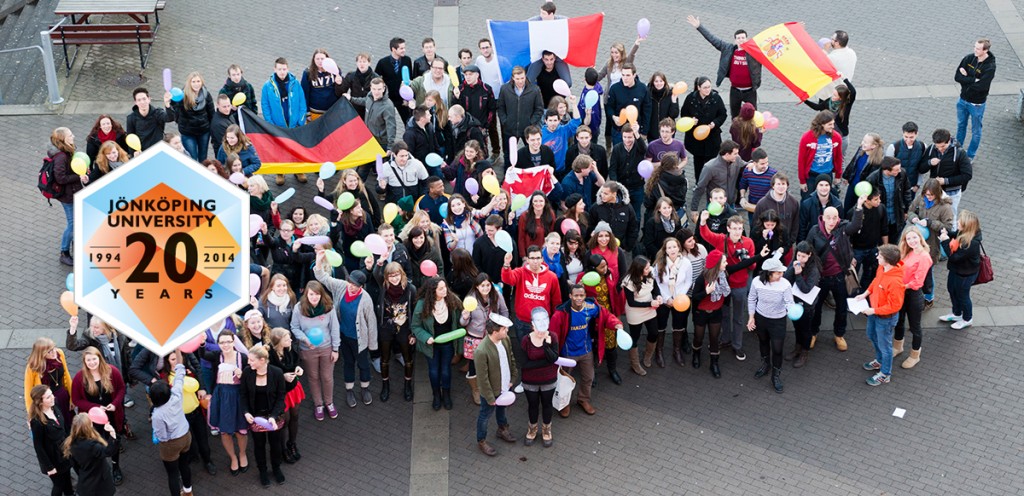Assistant professor in informatics, information architect, designer, piano player, author.
Forrest Gump, the Playstation and the invasion of international students
Twenty years is a long period of time for a human being. For most of our students, twenty years would mean going back to when they were newborn or toddlers.

1994, the year JIBS opened up for business (literally), was the year Tom Hanks starred in Forrest Gump and Quentin Tarantino gave us Pulp Fiction. It was also the year Sony introduced the PlayStation One. In August, Aftonbladet opened up its website. In December, Netscape launched Netscape Navigator 1.0, its Web browser. Mobile phones were nowhere close to being the ubiquitous commodity they are today. The fastest personal computers used the newest i486 processors from Intel.
I was not here in Jönköping at the time. I have no idea how it was like. Small city, new university, plenty in the making. At the time I was in Milan, Italy, which is a big city, at the Politecnico, founded 1863. I was finishing up my studies, working, and one year into my marriage. Pretty busy, and not really into what might have been happening someplace in Småland.
The world in 1994 was pretty busy as well, as usual: Nelson Mandela had just become president of South Africa, OJ Simpson was fleeing police in his white Bronco on live TV, Boris Yeltsin was ordering Russian troops in Chechnya, the Italian cruise ship Achille Lauro burned and sank off the Somali coast. On May 6, the Eurotunnel between France and England was opened for traffic.
Did any of this have an impact back then? What ideas of higher education did the school pursue? Was JIBS any different? I can’t say for real. What I can say is that today, twenty years later, it seems difficult to imagine Jönköping without JIBS. And not only for the key-shaped buildings on campus: I expect Spira to take over the role of “iconic image of the city” in the long run. No, it’s mostly because of the impact that such an international work environment, both its research and its teaching, and its entrepreneurial drive have had on the city. Twenty years later, that is a tangible result and the most important piece of work the school has accomplished.
What makes JIBS different then? What makes it good? And for what exactly?
I think nobody knows better than the students themselves. Those who actually took the leap. I wasn’t here, so I asked: I exchanged a few mails with past students and had a few chats with my current ones. These were enlightening conversations: I listened to whatever ups and downs they were or are going through, took note of particular tough rides and of exhilarating achievements, learned that the plain common-sense commitment to delivering in a fast changing world was one of JIBS’ best assets, and was told how that asset almost entirely relies on how JIBS makes its multicultural environment, its internationality, one of its strengths.
Some of them moved back to their home countries for a little while, then took a leap and left for jobs at the four corners of the globe. JIBS people can be found everywhere, and that in itself is an amazing accomplishment for such a young, lean school.
Rasa is now working for Austrian event company Pioneers in Milan, Italy, and she focuses on the global startup scene development – she brings technology and entrepreneurship together. She remembers how she was given a chance to organize the first Startup Live Jönköping External link, opens in new window.– a three-day incubator event – while still a student and how that experience shaped her expectations. Rasa still considers JIBS the one necessary step she took to move on with a successful career in an international environment.
Even my current students seem to just point out that’s what really makes the difference. Whether hailing from China, Pakistan, Canada, Germany, France, Chile, or Rwanda, Sweden and the multicultural environment at JIBS gets top mentions all the time. As one of my current master students put it, “JIBS has so far been a great experience for me. It’s the friendly international environment. It makes up for the cold weather and the little winter sunlight”. Now, I’d argue there is magic even in the darkest of months and that what really makes up for the little winter sunlight is the crazy long hours of spring and summer sunlight, but the international environment? I agree a hundred percent. And it’s a friendly international environment, just the way it should be in a small entrepreneurial city in the heart of Sweden.
If this is what has brought us here, twenty years that went fast, what will happen next? What future challenges await the school? Again, difficult to say. I’ll gladly pass on this, I would get it wrong anyway: let me entirely avoid any attempt at trying to predict the future. What I can do is tell you I’m with Alan Kay on this: the only way to predict what will happen is to build it. This I think has been the intuition all along. JIBS, entrepreneurial in mind, responsible in action, international at heart as the school motto goes, has always been about making it happen. A particularly valuable asset in a world that is just getting increasingly smaller and more complex. Act. Learn. Build. Improve. Repeat. This is what the school is teaching its students, this is what the school is doing, this is what it should be doing.
I’m not sure I will be here in 2034 to celebrate the school’s forty years. I’m not even sure that would be a good thing: entrepreneurial in mind, right? So here’s my wish for the next twenty years of JIBS: keep moving. Keep doing. Just do it better. It’ll be fine.
Read more:
Johan Roos – Authenticity makes a difference
Karin Hellerstedt – International at heart, International at start – Att snabbt internationalisera en verksamhet
Charlotta Mellander – Varje handelshögskola kräver sina stjärnforskare
Mattias Nordqvist – En internationell handelshögskola föds
Detta är en bloggtext. Det är skribenten som står för åsikterna som förs fram i texten, inte Jönköping University.







